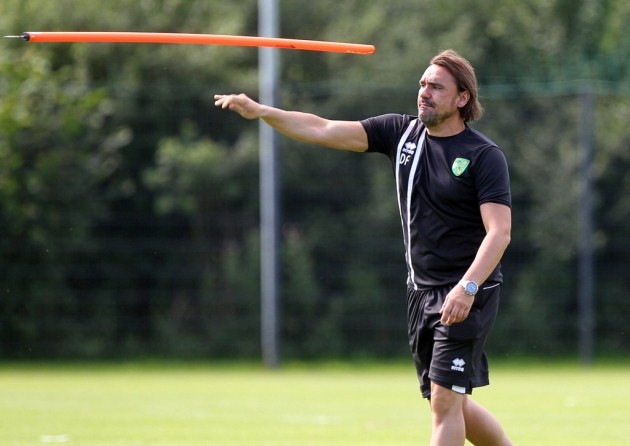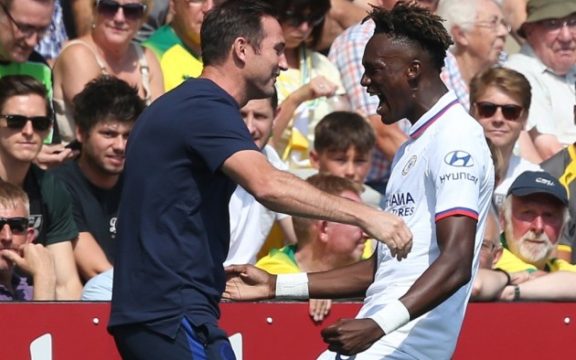Paul Lambert’s return as Ipswich Town boss provides a fascinating contrast with Daniel Farke. Paddy Davitt detects plenty of common ground between the rivals.
Let me share a joke I had with Paul Lambert when he was at the very peak of his powers at Norwich City.
It was May 2011. A warm evening in the Fine City.
The location: City Hall just before Lambert led his players onto the balcony to take the acclaim of the thousands gathered below. The Scot had followed up a League One title triumph with a remarkable promotion to the Premier League. Lambert was king of all he surveyed.
I told him that night, after a second consecutive promotion, he deserved to be awarded the Honorary Freedom of the City.
Paul Lambert enjoyed that champagne feeling of promotion success at Norwich City Picture: Chris Radburn/PA
Lambert replied, ‘so they should’ but with a smile so wide that suggested he did not expect it any time soon and in all honesty could think of nothing worse than having such prestigious recognition bestowed upon him.
The genius of Lambert was an ability to deflect all the praise outward; towards his players or those ‘marvellous’ supporters, while the spotlight remained firmly fixed on him and his alchemist’s touch.
Lambert was reluctant to be front of house yet no-one was in any doubt who was the boss.
Maybe the sands were already shifting on that balmy May evening, as the intoxicating aroma of success hung in the night sky and thoughts turned to what lay ahead in the big time.
Nelson Oliveira crossed Daniel Farke to his cost at Norwich City. Picture: Paul Chesterton/Focus Images
Literally 13 months later, Lambert was gone. A toxic parting of the ways facilitated a move to Aston Villa after comfortably keeping City in the top flight at his first attempt. Few present at Carrow Road for the final game of that season would forget how he was feted by the travelling Villa support, when the speculation was starting to circle this magic carpet ride was about to hit terra firma.
Lambert deserved what he clearly felt at the time was a step up in his managerial career.
His body of work alongside Ian Culverhouse and those unheralded players during the previous few seasons was remarkable. In that there is a clear parallel with the way Daniel Farke has bucked the trend to manoeuvre his Norwich City to top spot in the Championship.
The same dream realised by Lambert is now within his grasp over these coming months. Do that and Farke would be heralded in the same manner; probably from the same balcony in truth.
But this weekend their paths cross for the first time. Old and new, the past and the present, top versus bottom. The strands are deliciously varied, the sub-plots guaranteed to elevate this derby above any other since those play-off tussles in 2015.
Lambert, of course, knows exactly what it feels like to mastermind two thumping victories over the old enemy. An aggregate 9-2 victory in that Championship promotion-winning season is still revered to this day. The savage intensity of City’s 5-1 win at Portman Road, just two games before that Premier League-clinching date at Portsmouth, was arguably Lambert’s highpoint.
Now the Scot seeks to dent his old club’s bid to repeat that achievement.
There are those who will inevitably voice their anger Lambert could ever have countenanced crossing the East Anglian divide, via a circuitous route. Given his mastery at forging a siege mentality – the ‘us against the rest’ outlook that powered a glorious ascent when he wore green and yellow – it would be a huge mistake to make this weekend all about Lambert.
That would be to risk giving him and his relegation-threatened side a psychological lift.
Motivation will be high enough to end a wretched run in this neighbourly squabble that dates back to April 2009, without trying to divert the focus away from Norwich’s quest to take another step on the road to promotion.
In the fullness of time, when Lambert and Farke for that matter have long since departed, the Scot’s achievements at Norwich will stand the test. For that, the Hall of Famer should retain a special place in the modern day history of the club. But this is now Farke’s time.
What we witnessed in such thrilling fashion at Elland Road was a team on the cusp of attaining a prize so unexpected it evokes memories of the way Lambert’s fearless group swept through two divisions.
Paul Lambert returns to Carrow Road as Aston Villa boss for the first time. Picture: Paul Chesterton/Focus Images
His team was full of streetwise hustlers, whereas Farke has moulded a unit rich in youth and astute overseas recruits.
Both leaders have maximised limited resources to compete at the right end of the division on an equal footing with far richer rivals.
But Farke is the polar opposite of Lambert as a character. Lambert’s aura of supreme self-confidence may have been dented, from when he prowled a touchline in his City tracksuit, but looking at this distance he appears to remain a brooding character; a fiercely driven, intense individual.
Farke has his moments, as the water bottle fired against the wall of the away dugout when Onel Hernandez sliced an early clearance at Elland Road testifies, but he prefers carrot rather than stick. Albeit in the manner Lambert’s former lieutenant Russell Martin was jettisoned, or Nelson Oliveira put out to pasture, there is a hidden steeliness. Yet it resides below the surface when under Lambert it routinely erupted.
Farke’s media briefings resemble a focus group. Lambert’s at Norwich were an assault on the senses. An acidic barb and a withering look his stock-in-trade.
The contrast in personality is marked.
So much so, when the two men exchange pleasantries seconds before kick off on Sunday it may be tempting to spot only the differences.
In truth, they have much more in common, beyond a shared goal to get Norwich City to the Premier League against the odds.




![Paddy’s Pointers: Five observations from City 0, Chelsea 7 [SEVEN]](https://pjdavittbooks.co.uk/wp-content/uploads/2022/01/chelsea-576x360.jpg)
